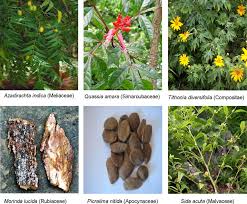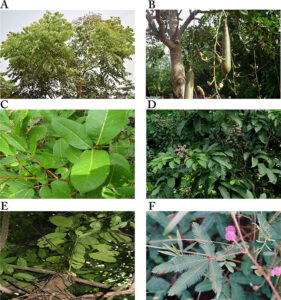Back to: Botany 500 Level
My correct Afrilearn botanist, how body today?
I dey hail you specially because you dey show real dedication to learning something wey go benefit not just you but your community, your culture, and your future career. Today, we go talk about one topic wey sweet well and close to home—Overview of Nigerian Medicinal Plants. This one na deep part of our heritage, and e go open your eye to how nature dey give us medicine before chemist ever land.
Overview of Nigerian medicinal plants
From village to city, for every part of Nigeria, you go hear people talk say “chew bitter leaf for malaria” or “use scent leaf boil water for fever”. These na examples of medicinal plants wey our people don dey use for centuries. Long before hospitals and tablets, our forefathers don dey use herbs to cure sickness, treat wounds, and promote good health.

These plants no be guess work—many of them even dey used now in modern medicine after scientists test and confirm say dem truly work. Make we look into this treasure chest of Nigerian medicinal plants.
Body – Nigerian Medicinal Plants and Wetin Dem Do
Here are some well-known medicinal plants in Nigeria, and wetin dem dey used for:
- Neem (Dogoyaro) –
Very common across Nigeria. Leaves dey used to treat malaria, skin infections, and boost immunity. Some people soak the leaves in hot water and drink the tea. - Bitter Leaf (Vernonia amygdalina) –
Popular for treating malaria, typhoid, and stomach troubles. E bitter no be small, but e work! People dey squeeze the leaf and drink the juice. - Scent Leaf (Ocimum gratissimum) –
Also called Nchuanwu or Efirin, depending on your tribe. Used for treating cough, flu, and stomach ache. You fit boil am and drink or even chew directly. - Aloe Vera –
This one good for skin burns, wounds, and also helps with constipation. The gel inside the leaves dey soothing and healing. - Moringa (Zogale) –
Highly nutritious and medicinal. Leaves, seeds, and even flowers dey used. People use it to treat high blood pressure, diabetes, and boost energy. - Guava Leaves –
Boiled guava leaves dey used to treat diarrhoea and aid digestion. Na cheap but powerful remedy. - Turmeric (Ata Ile Pupa) –
This root dey used for anti-inflammatory purposes. It helps with joint pains and boosts the immune system. - Lemon Grass –
Boiled for fever and malaria treatment. E also dey help with relaxation and sleep.

Why These Plants Matter
- Affordable and Accessible: Many people for rural areas fit reach these plants easily without buying expensive drugs.
- Cultural Significance: Herbal knowledge dey passed down through generations, showing the wisdom of our ancestors.
- Health Benefits: Scientists don begin research many of these plants, and plenty of them don prove effective.
- Conservation Need: As we dey modernise, some of these plants dey disappear. That’s why you, as a future botanist, need to help preserve and document them.

Real Life Example
Imagine one elderly woman for Benue wey sabi mix scent leaf, bitter leaf, and lemon grass to treat common cold. She no go chemist, but her mixture dey work because she understand her environment well. Na traditional knowledge be that—and na ecology and botany go help preserve am for future generations.
Summary:
- Nigeria get rich collection of medicinal plants like neem, bitter leaf, scent leaf, moringa, and turmeric.
- These plants help treat malaria, infections, fever, digestive issues, and more.
- They are natural, affordable, and rooted in traditional African wisdom.
- Protecting and studying them dey important for health, culture, and science.
Evaluation:
- Mention three Nigerian medicinal plants and wetin dem dey used for.
- Why is it important to preserve medicinal plants in Nigeria?
- What are the benefits of using traditional medicine in today’s world?
You don take another powerful step in connecting science with our African roots. Always remember say the knowledge wey our people get dey valuable—and you, my Afrilearn botanist, go carry am into the future with pride. Keep going strong, because the next lesson go sweet even more!
